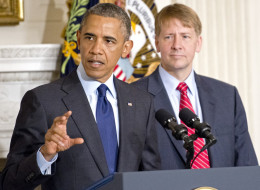WASHINGTON -- If Congress can't pass legislation to keep the government funded by Monday at midnight, the Smithsonian museums will close, the Centers for Disease Control will halt its influenza monitoring program and up to 800,000 federal workers (many of whom have already faced unpaid leave due to sequestration) will be furloughed.
But shutting down the federal government won't stop two of the Republican Party's most despised bogeymen: Obamacare and the Consumer Financial Protection Bureau.
Obamacare is at the center of why there may be a shutdown beginning Tuesday. Instead of passing a clean continuing resolution to fund the government, House Republicans -- egged on by Sen. Ted Cruz (R-Texas) -- have insisted that President Barack Obama's signature health care law be defunded or delayed. The Democratic-controlled Senate, however, has rejected that approach. Without agreement, there will be a shutdown.
A report in July by the nonpartisan Congressional Research Service found that Obamacare -- including the individual mandate detested by so many conservatives -- would still be in effect during a shutdown.
"If a government shutdown were to occur during calendar year 2014, the lapse in funding would not automatically suspend the requirement of the individual mandate," the report said. "In other words, during the time period that the government is shut down, taxpayers who fall within the coverage of the individual mandate would still be accruing penalties for any months in which they lacked minimum essential coverage."
"Many of the core parts of the health care law are funded through mandatory appropriations and wouldn't be affected," Gary Cohen, the Health and Human Services Department official overseeing the health care rollout, told reporters this week.
For years, Republicans have tried to block the CFPB, which was first proposed by Sen. Elizabeth Warren (D-Mass.) when she was still in academia. It was only in July, when Senate Majority Leader Harry Reid (D-Nev.) threatened to change Senate rules, that Republicans ended a two-year blockade on Richard Cordray's nomination to lead the agency. They acknowledged that the problem was not Cordray. Instead, they wanted to use his nomination as leverage to change the CFPB's financing and structure, which would have gutted the agency and its independence.
Republicans have called for the CFPB to be subject to the congressional appropriations process. Supporters of the agency argued that it shouldn't be, since other banking regulators aren't either.
Because it gets its money from the Federal Reserve, and not Congress, it would remain open even if the government shuts down.
Republicans still have their eye on the bureau, though. This week, House Republicans put together a plan that would make raising the debt ceiling contingent on a GOP wish list of items, including giving Congress the authority to slash funding for the CFPB.
Original Article
Source: huffingtonpost.com
Author: Amanda Terkel
But shutting down the federal government won't stop two of the Republican Party's most despised bogeymen: Obamacare and the Consumer Financial Protection Bureau.
Obamacare is at the center of why there may be a shutdown beginning Tuesday. Instead of passing a clean continuing resolution to fund the government, House Republicans -- egged on by Sen. Ted Cruz (R-Texas) -- have insisted that President Barack Obama's signature health care law be defunded or delayed. The Democratic-controlled Senate, however, has rejected that approach. Without agreement, there will be a shutdown.
A report in July by the nonpartisan Congressional Research Service found that Obamacare -- including the individual mandate detested by so many conservatives -- would still be in effect during a shutdown.
"If a government shutdown were to occur during calendar year 2014, the lapse in funding would not automatically suspend the requirement of the individual mandate," the report said. "In other words, during the time period that the government is shut down, taxpayers who fall within the coverage of the individual mandate would still be accruing penalties for any months in which they lacked minimum essential coverage."
"Many of the core parts of the health care law are funded through mandatory appropriations and wouldn't be affected," Gary Cohen, the Health and Human Services Department official overseeing the health care rollout, told reporters this week.
For years, Republicans have tried to block the CFPB, which was first proposed by Sen. Elizabeth Warren (D-Mass.) when she was still in academia. It was only in July, when Senate Majority Leader Harry Reid (D-Nev.) threatened to change Senate rules, that Republicans ended a two-year blockade on Richard Cordray's nomination to lead the agency. They acknowledged that the problem was not Cordray. Instead, they wanted to use his nomination as leverage to change the CFPB's financing and structure, which would have gutted the agency and its independence.
Republicans have called for the CFPB to be subject to the congressional appropriations process. Supporters of the agency argued that it shouldn't be, since other banking regulators aren't either.
Because it gets its money from the Federal Reserve, and not Congress, it would remain open even if the government shuts down.
Republicans still have their eye on the bureau, though. This week, House Republicans put together a plan that would make raising the debt ceiling contingent on a GOP wish list of items, including giving Congress the authority to slash funding for the CFPB.
Original Article
Source: huffingtonpost.com
Author: Amanda Terkel

No comments:
Post a Comment